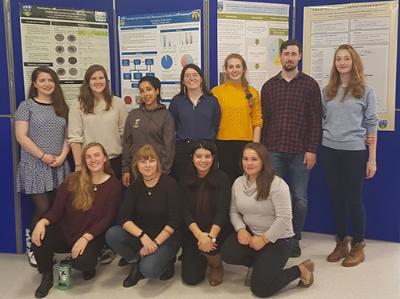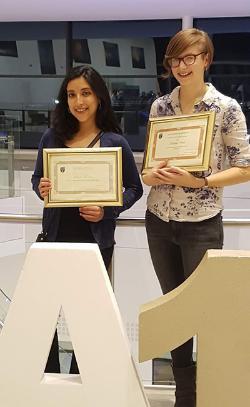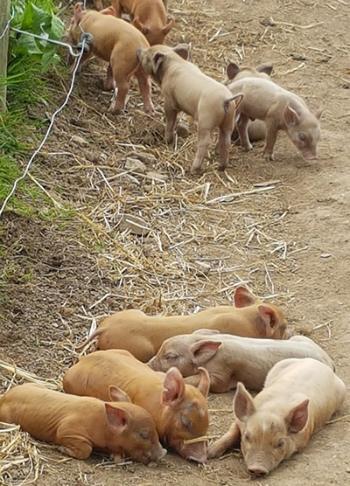Research News
Summer Student Research Projects
Every year, some of our Veterinary Medicine and Veterinary Nursing undergraduate students opt to carry out 4-8 week summer research projects. Students work with a clinical or pre-clinical supervisor to design a project on a topic which interests them. Research can be taken on at any stage during their degree, but it is most popular as part of a student’s clinical extramural studies (CEMS) placement in the summer after third or fourth year. Summer projects might involve working in a laboratory, developing and carrying out surveys, collecting samples from conservation areas, farms or parks or performing an overview of the veterinary literature to learn more about a topic. 
Undertaking a research project gives the students an opportunity to learn more about working in a research environment, giving them a better understanding of the research process and research methods. They develop skills of designing, carrying out and analysing their studies, be they lab-based or desk-based. Participation in summer research projects encourages the students to see themselves not just as future veterinary professionals, but also as researchers and investigative scientists.
In 2019, 25 students completed a summer research project (pictured above: a group of students presenting posters on their research projects). While most students stayed in Ireland, some students travelled abroad. International projects ranged from working with Singaporean-based researchers on a bat conservation project in Cambodia to working with University of California at Davis researchers on a project to describe bacterial infection in Pacific marine mammals. Closer to home, students worked with researchers in the UCD School of Veterinary Medicine undertaking lab-based projects to examine antimicrobial resistance in free-range pigs and in mare-foal pairs, to learn about viral transmission and develop antiviral therapies, to develop a test to detect fragile foal syndrome and to examine gut microbes of newly weaned pigs who have been fed prebiotics derived from seaweed extracts.
Other projects included a study of the types of pathogens carried by seagulls and examining the prevalence of parasites and ticks in the Dublin area (including in exotic animals). Students carried out surveys to probe veterinarian knowledge of treating animal behaviour and questionnaires to examine knowledge of canine-related legislation
Students also have the option to apply for research projects as part of the Professional Work Experience programme at the Department of Agriculture. These projects involve working with supervising vets at Agriculture House, Backweston or at one of the Regional Veterinary Laboratories.
 Students will present their work at national conferences (e.g. Association for Veterinary and Teaching Research Work) and international conferences (e.g. British Veterinary Zoological Annual Meeting) and one 2019 summer research project on veterinary behaviour medicine has already been accepted for publication. In September, 14 students from the school of veterinary medicine presented posters, along with 100 other students, at the Summer Student Research Awards in UCD. Martha Crowe (see below) was shortlisted for the award and received a bronze award for her project on antimicrobial resistance in free range pigs. Atiyah Bagha received a silver award for her poster describing tick prevalence in the Dublin area. (Pictured left: Atiyah and Martha at the SSRA presentations in UCD)
Students will present their work at national conferences (e.g. Association for Veterinary and Teaching Research Work) and international conferences (e.g. British Veterinary Zoological Annual Meeting) and one 2019 summer research project on veterinary behaviour medicine has already been accepted for publication. In September, 14 students from the school of veterinary medicine presented posters, along with 100 other students, at the Summer Student Research Awards in UCD. Martha Crowe (see below) was shortlisted for the award and received a bronze award for her project on antimicrobial resistance in free range pigs. Atiyah Bagha received a silver award for her poster describing tick prevalence in the Dublin area. (Pictured left: Atiyah and Martha at the SSRA presentations in UCD)
We are very thankful to the philanthropic donations and grant agencies who sponsored the research as well as to all the supervising researchers who work with our students to make their summer research projects a success.
Summer Student Research Projects are coordinated by Dr Alison Reynolds ((opens in a new window)alison.reynolds@ucd.ie)
Martha Crowe, fourth year Veterinary Medicine student and SSRA bronze award winner describes her experience of summer research.
Over the summer, instead of just doing clinical placements, I decided to try my hand at research. I spent a little over 6 weeks working with Assoc Prof Finola Leonard on anti-microbial resistance (AMR) in free-range pigs, and I can honestly say that it’s been my favourite CEMS placement so far. I have always liked lab work and am hugely interested in AMR, so the prospect of driving around the country collecting pig poo was actually pretty appealing! 
From hunting down farms via the old reliable Google, to discovering that my first farm had a grand total of 7 pigs with said pigs deciding that my wellies were for lunch, it was a blast from start to finish. Anyone else who was working in the lab at the time might not agree with me though; there’s nothing quite like the smell of faecal samples left in an incubator.
As fun as collecting my samples was, the actual processing of the samples and getting results was what I really loved. I developed a weird fascination with seeing what grew on my agar plates, to the point where E. coli smells nice and familiar to me. In an ideal world, my results would have shown no AMR in free-range pigs but unfortunately there were low levels of resistance on every farm. Still, I learnt a lot over the few months, and most importantly, I got to play with some pretty cute pigs!
This piece originally featured in the (opens in a new window)Veterinary Ireland Journal.
For more on Summer Student Research Projects and the Thomas O'Hanlon Memorial Award, please see the 2019 edition of UCD Veterinary Community News
Foot and Mouth Disease Atmospheric Dispersion System
A decision support system to aid in the risk evaluation of airborne animal diseases has been developed for Ireland. The system's primary objective is to assist in risk evaluation of the airborne spread of Foot and Mouth Disease (FMD). The operational system was developed by Met Éireann – the Irish Meteorological Service and UCD CVERA (Centre for Veterinary Epidemiology & Risk Analysis), in co-operation with NOAA-ARL (National Oceanic and Atmospheric Administration – Air Resources Laboratory) and ECMWF (European Centre for Medium-Range Weather Forecasts). The infrastructure largely relies on the HYSPLIT dispersion model driven by both ECMWF meteorological forecasts for longer range simulations, and HARMONIE-AROME meteorological forecasts, a high resolution local area meteorological model, ideal for shorter range national emissions. Following on from previous work by the Bureau of Meteorology, Australia as well as the Australian Department of Agriculture, Fisheries and Forestry, further modifications were made to the HYSPLIT source code to improve the model's characterisation of the Foot and Mouth Disease virus.
FMD is a highly infectious disease among cloven hoofed animals that can transmit via airborne means. Biological characteristics related to temperature, humidity, lifespan as well as atmospheric washout were all incorporated either through new or existing functionality of the dispersion model. Combining the model dispersion capabilities of HYSPLIT with a virus emission model and GIS mapping software with farmland zoning, the disease dispersion system becomes a powerful analysis and decision support tool. This airborne animal disease atmospheric dispersion system helps improve emergency preparedness, as well as aid confinement and eradication strategies for relevant Irish authorities, during a disease outbreak. The associated open access paper appears in Advances in Science and Research and is available at (opens in a new window)https://doi.org/10.5194/asr-16-113-2019
European Perspectives on Efforts to Reduce Antimicrobial Usage in Food Animal Production
New regulations on veterinary medicines and medicated feed will substantially influence antimicrobial prescribing and usage throughout Europe into the future. In an invited talk at the 70th Annual Meeting of the European Federation of Animal Science in Ghent, Professor Simon More presented an overview of efforts within Europe to reduce antimicrobial usage in food animal production. Substantial scientific progress has been made on the measurement of antimicrobial usage, including at herd-level, and on the objective measurement of farm biosecurity. Further, in a number of EU member states, monitoring systems for usage are well established, allowing benchmarking for veterinarians and farms and monitoring of national and industry-level trends. The new regulations offer an important springboard for further progress, in order to preserve the efficacy of existing antimicrobials.